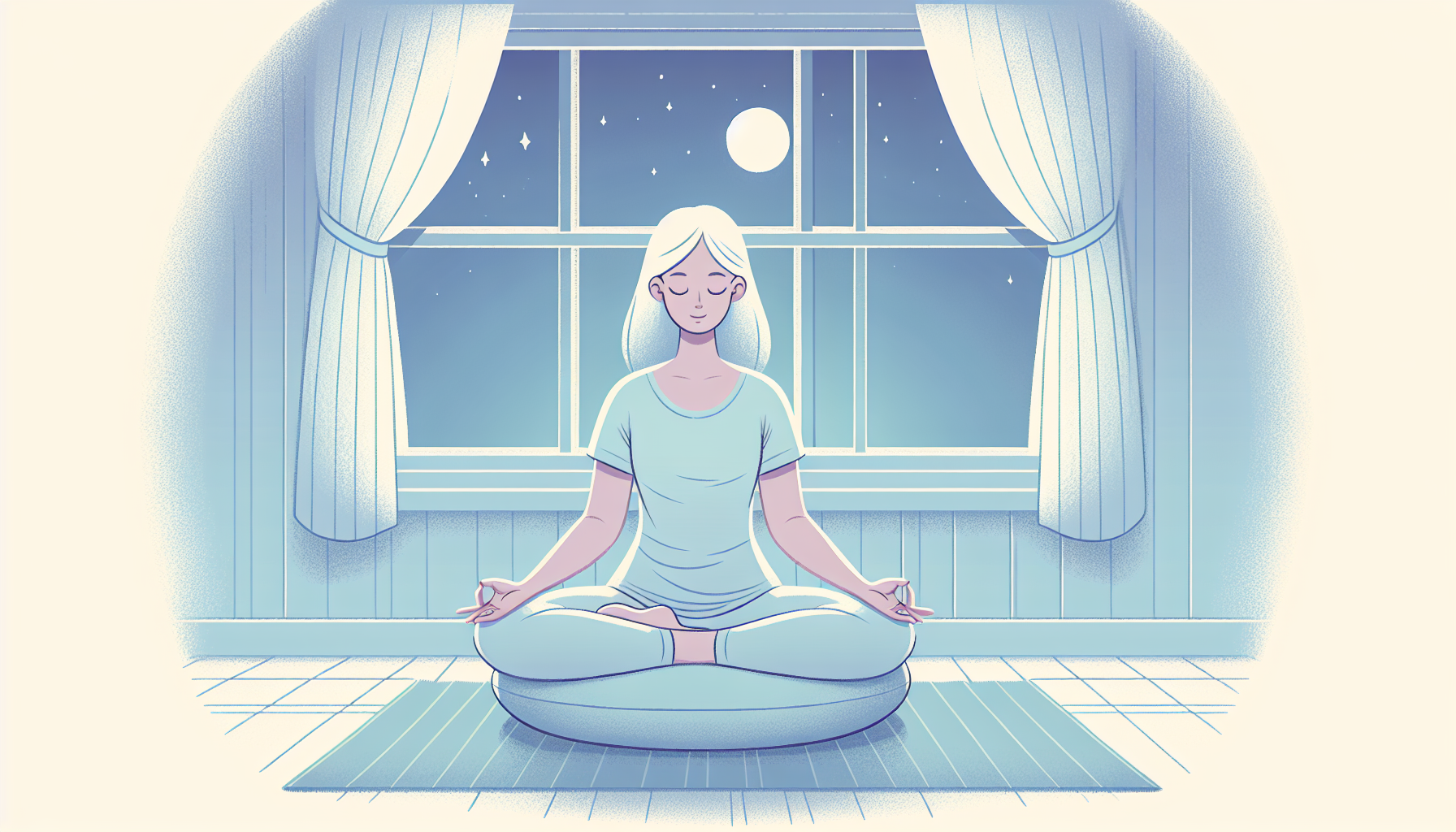Trouble sleeping? Meditation for sleep is a practical approach to help you relax and drift off. This guide unpacks simple, effective meditation exercises with the promise of better sleep quality, without any gimmicks or unnecessary jargon. Get ready to say goodbye to those sleepless nights.
Key Takeaways
-
Meditation is a powerful agent for improving sleep through practices such as guided sleep meditation. It reduces stress and anxiety levels and prepares the body for rest.
-
Techniques including guided sleep meditations with calming soundscapes, body scan relaxation, and visualization exercises can significantly enhance sleep quality.
-
Creating a conducive sleep environment and using modern tools like meditation apps and podcasts can greatly improve sleep onset, quality, and continuity, assisting in a rejuvenative rest.
The Benefits of Meditation for Sleep
The medical literature indicates that mindfulness meditation may improve sleep quality, particularly when compared with nonspecific active controls. A systematic review and meta-analysis found moderate evidence that mindfulness meditation interventions significantly improved sleep quality compared with nonspecific active controls at postintervention and at follow-up.
Meditative movement, which includes practices such as tai chi, qi gong, and yoga, has also been reported to have beneficial effects on sleep measures in various populations. Improvement in sleep quality was often accompanied by improvements in quality of life, physical performance, and depression.
A randomized clinical trial comparing tai chi and conventional exercise to a passive control group found that both active interventions improved sleep efficiency and reduced wake time after sleep onset, with these effects being maintained at a 24-month follow-up.

The Power of Meditation for Sleep
Sleep meditation, a time-honoured practice, not only serves spiritual pursuits but also aims to enhance sleep quality. Meditation contributes to sleep readiness and prepares your body for a restful night by physiologically slowing down the heart rate and lowering cortisol levels.
Guided sleep meditations, in particular, are known for their manifold benefits. These include:
-
promoting relaxation
-
reducing anxiety and stress
-
enhancing mindfulness
-
improving sleep quality
Given these benefits, embarking on the journey of sleep meditation seems like a no-brainer.
Fall Asleep Faster
Curling up in bed only to find sleep elusive can be frustrating. That’s where meditation comes into play. This practice, an effective way to calm the mind and prepare the body for sleep, aids in falling asleep swiftly.
Establishing a routine incorporating 10 to 30 minutes of meditation can yield significant benefits. This practice is known to improve sleep onset, helping you transition from a busy day to a peaceful night with ease.
Reduce Anxiety and Stress
Stress and anxiety often disrupt our precious sleep in the hustle and bustle of our modern world. Meditation can have a positive impact on mental health by:
-
Reducing symptoms of anxiety and depression, thereby promoting a peaceful slumber
-
Focusing on breathing during meditation allows you to stay present, preventing anxious thoughts from overwhelming the mind.
-
Sleep meditation can significantly reduce stress-related inflammation and improve insulin resistance by lowering cortisol levels.
The benefits don’t stop there. Emotion regulation, happiness, and distress reduction are also associated with the state of awareness during meditation. Peaceful sleep, here we come!
Improve Sleep Quality
Sleep meditation isn’t just about falling asleep faster – it’s about improving the quality of the sleep we get. Consistent sleep meditation practice can enhance melatonin and serotonin levels, leading to physiological changes such as a lowered heart rate and controlled breathing. These changes promote better sleep quality, allowing you to wake up feeling refreshed and rejuvenated.
You might wonder how meditation achieves this. Well, it all comes down to our brainwaves. Meditation aids in transitioning the brain into a sleep-promoting state by inducing theta brainwaves, which are associated with the early stages of sleep. So when we meditate, we’re giving our brain a nudge towards a good night’s sleep.
Guided Meditations for Restful Sleep
Exploring guided meditations presents a novel pathway to achieving restful sleep. These meditations enhance sleep quality through focused mindfulness practices and structured relaxation techniques, guiding you gently to dreamland.
Guided meditations for sleep employ a diverse range of techniques, including:
-
Box breathing
-
Calming sounds
-
Body scans
-
Deep relaxation exercises like envisioning descending escalators to tranquillity
In recent years, top sleep meditation apps have combined sleep-inducing stories with guided meditations and input from sleep experts to facilitate the transition into restful sleep.
Soothing Soundscape
With their power to transport us to a tranquil realm, music and sounds serve as ideal elements in sleep meditation. The Calm app, for instance, offers a selection of meditations including sleep stories and breathing exercises complemented by music and natural soundscapes.
Further extending the soundscape, ‘Deep Energy’ is a podcast specialising in ambient New Age music designed to aid in meditation or sleep. Incorporating calming nature sounds and gentle music can enhance the experience of drifting off to sleep, making your journey to the dreamland a melodious one.
Body Scan Relaxation
Adding to the sleep meditation arsenal is body scan meditation, another potent tool. This technique helps individuals prepare for sleep by bringing awareness to sensations in different parts of the body without attempting to alter them.
During a body scan, you’re encouraged to adopt an attitude of curiosity and openness, focusing on the experience of bodily sensations in the present moment. The process is methodical, directing attention to sensations from the top of the head, moving down through the face, shoulders, arms, back, and chest, and continuing all the way to the legs and feet.
By the end of the body scan, you’re likely to feel deeply relaxed and ready for a restful night’s sleep.
Visualizing Serenity
Visualization serves as a potent tool in sleep meditation. Visualizing tranquillity through meditation can aid in achieving a state of deep relaxation conducive to sleep.
For instance, one of our podcast episodes, ‘Blanket Of Warmth – Guided Sleep Meditation’, guides listeners to imagine a warm blanket moving over their body, inducing deep relaxation. The power of the mind is truly remarkable. With just a few guided images, we can create an environment of serenity, paving the way for a sound sleep.
Calming Techniques for Better Sleep

In addition to the structured pathway offered by guided meditations, various calming techniques can be integrated into your bedtime routine for enhanced sleep. These techniques range from mindful breathing to progressive muscle relaxation and even bedtime yoga poses.
Embracing these calming techniques doesn’t only foster more restful sleep, it also helps establish a mindful bedtime routine that signals your body to wind down, thus promoting improved sleep quality.
Mindfulness Breathing
Many meditation practices consider mindful breathing exercises as a fundamental element. These exercises activate the parasympathetic nervous system, leading to physiological benefits such as reduced stress and decreased heart rate and blood pressure, which are beneficial for inducing sleep.
Establishing a routine with mindful breathing exercises can send a signal to your body that it’s time to relax and create a calming pre-sleep ritual, thereby enhancing sleep quality. Techniques such as 4-7-8 breathing, diaphragmatic breathing, and alternate nostril breathing can be practised to trigger relaxation and aid in sleep preparation.
And if sleep remains elusive, mindful practice out of bed is advised, preventing the association of the bed with wakefulness. After all, the goal is not just to fall asleep but to create a mindful connection with your body and mind.
Progressive Muscle Relaxation
Progressive muscle relaxation, a technique that systematically tenses and then releases different muscle groups, helps alleviate physical stress and promotes a relaxation state conducive to sleep.
The procedure involves tensing and then releasing different muscle groups, starting at the head and working towards the feet, to reduce physical tension. During the practice, you should inhale before tensing muscles, hold your breath while holding the tension, and then exhale while relaxing the muscles.
By the end of the practice, your body should feel relaxed and ready to drift into a state of peace, preparing for a good night’s sleep.
Bedtime Yoga Poses
Another calming technique that can be added to your bedtime routine is yoga. Styles such as yin yoga, restorative yoga, and gentle hatha yoga are ideal for bedtime due to their focus on slow movements, deep breathing, and stretches.
Yoga poses that are recommended for easing into sleep include:
-
Child’s Pose
-
Butterfly Pose
-
Legs up the Wall
-
Cat-Cow
-
Happy Baby
Creating the Ideal Sleep Environment
Crafting the perfect sleep environment is equally important to the techniques and practices you employ to induce sleep. This includes using dark curtains or shades to maintain a dark sleeping environment, which is crucial for the body’s production of melatonin and overall sleep quality.
Furthermore, setting the bedroom temperature between 60 and 67 degrees Fahrenheit aligns with the body’s natural temperature drop during sleep, thus enhancing sleep quality. Reducing noise levels in the bedroom can also significantly contribute to entering and maintaining deep sleep and lessening the likelihood of nighttime disturbances.
Comfortable Bedding
Selecting the appropriate bedding plays a crucial role in ensuring a good night’s sleep. High-quality bedding involves considering factors like material, breathability, and personal sleep position preferences to ensure optimal sleep comfort.
Comfortable and supportive mattresses, soft, breathable sheets, and appropriate pillows can significantly improve sleep quality, helping you achieve good sleep and feel rejuvenated upon waking. Regular cleaning and bedding maintenance are also essential for promoting a healthy sleep environment and supporting mental well-being.
After all, nothing beats the feeling of climbing into fresh, clean sheets at the end of a long day and tossing away your worries to recharge!
Calming Scents
Scent, a powerful tool, can help create an inviting sleep environment. Essential oils like:
-
lavender
-
rose
-
chamomile
-
geranium
-
jasmine
-
sweet marjoram
-
bergamot
are known for their relaxing properties and can be used to promote sleep.
Incorporating lavender, chamomile, and vanilla scents into the bedroom can help create a tranquil environment conducive to better sleep quality. These calming scents can be introduced into the bedroom via diffusers, baths, lotions and massage oils incorporated into pre-sleep routines.
Limiting Screen Time
In our tech-driven era, the allure of screens can frequently disrupt our sleep patterns. However, limiting exposure to screens and artificial light before bedtime can support the natural sleep cycle by reducing blue light exposure.
Switching off your screens at least an hour before bed can be a game-changer for your sleep quality. Instead, consider engaging in calming activities like reading a book, listening to soothing music, or practising mindfulness exercises. These can help you wind down and prepare your body for a rejuvenating night’s sleep.
Meditation Apps and Podcasts for Sleep

Given today’s technological era, the abundance of meditation apps and podcasts designed to help you attain better sleep is unsurprising. Some popular apps include:
-
Headspace
-
Calm
-
Insight Timer
-
Sleep Cycle
-
Relax Melodies
These apps offer a wealth of resources, including sleep stories, guided meditations, and sleep music to help users wind down and fall asleep.
These digital resources often include features such as a sleep timer and a variety of narratives or sounds, catering to different preferences and needs. Whether you prefer calming soundscapes or soothing stories, there’s a sleep meditation app or podcast out there for you.
Top Sleep Meditation Apps
Headspace, for instance, offers a diverse selection of guided meditations and customizable sessions accessible offline, catering to both novices and seasoned practitioners.
Other noteworthy apps include the Healthy Minds Program. This cost-free app presents a systematic curriculum grounded in the scientific principles of Awareness, Connection, Insight, and Purpose, crafted by researchers at the University of Wisconsin-Madison. Smiling Mind focuses on children, teens, and young adults, providing a comprehensive beginner’s program to cultivate mindfulness habits through an accessible and engaging format.
Favorite Sleep Meditation Podcasts
Podcasts like Tracks To Relax offer a blend of guided meditations, bedtime stories, and ambient soundscapes designed to hasten sleep. New episodes are available every Tuesday and most weekends.
If you prefer listening to whimsical, rambling stories, ‘Sleep With Me’ and ‘Game of Drones’ utilize monotonous storytelling to distract listeners into sleep. On the other hand, podcasts like ‘Get Sleepy’, ‘Send Me To Sleep’, and ‘Nothing Much Happens’ combine sleep meditation sequences, stories, and narratives to create a tranquil bedtime experience.
Summary
From understanding the power of sleep meditation to discovering various guided meditations, calming techniques, and ideal sleep environment practices, we’ve embarked on a comprehensive exploration of sleep meditation. We’ve also delved into the world of meditation apps and podcasts, highlighting some top picks to aid your journey towards restful sleep.
As we wrap up, remember that good sleep is within your reach. It’s all about creating the right environment and adopting practices that signal your body and mind that it’s time to wind down. So, why wait? Start your journey towards restful sleep through the gentle art of meditation tonight.
Frequently Asked Questions
What are the benefits of sleep meditation?
Sleep meditation can help you fall asleep faster, reduce anxiety and stress, and improve overall sleep quality. It’s a great way to promote better sleep.
What are some guided meditation techniques for sleep?
Try using soothing soundscapes, body scan relaxation, and visualizing serenity to guide your meditation for better sleep. These techniques can help you unwind and relax before bedtime.
What are some calming techniques for better sleep?
Try practicing mindfulness breathing, progressive muscle relaxation, or bedtime yoga poses to improve your sleep quality. These techniques promote relaxation and can help you get better sleep.
How can I create an ideal sleep environment?
Use comfortable bedding and calming scents, and limit screen time to create an ideal sleep environment. This will improve the quality of your sleep.
What are some top sleep meditation apps and podcasts?
You can try Headspace, Calm, Healthy Minds Program, and Smiling Mind for sleep meditation apps, and ‘Tracks To Relax’ and ‘Sleep With Me’ for podcasts. These can help you improve your sleep and relaxation.
Disclaimer: This article is for informational purposes only and should not replace professional medical advice. If you have specific concerns or medical conditions, it is recommended to consult with a healthcare professional for personalised guidance and support.
Resources
Rusch HL, Rosario M, Levison LM, et al.
Annals of the New York Academy of Sciences. 2019;1445(1):5-16.
The Effect of Meditative Movement on Sleep Quality: A Systematic Review.
Wang F, Eun-Kyoung Lee O, Feng F, et al.
Sleep Medicine Reviews. 2016;30:43-52.
Siu PM, Yu AP, Tam BT, et al.
JAMA Network Open. 2021;4(2):e2037199.
Sleep and Aging: The Fountain of Youth






